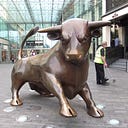Your Next Favourite Macroeconomist
People don’t really write about economics as if it was pop music but they should.
Economics gurus come into fashion with roughly the same frequency as indie bands — not many of us think all that much about Greg Mankiw or Hootie and the Blowfish any more, but at one point they were both big box office. Recognition among the cognoscenti isn’t always the ticket to mainstream popularity either — Joseph Stiglitz writes more than enough op-eds and the occasional blockbuster book, but he’s very much at the Flaming Lips level of prominence, compared to his fellow Nobelist Paul Krugman, who can only sensibly be analogised to Radiohead or U2.
I’ve got a pretty good track record in talent spotting pop economists — I was an early fan of both Krugman and Brad DeLong, literally before they were cool. I was one of the first people to jump on the anti-Freakonomics backlash. I’ve shared a beer (and co-write a blog) with John “Zombie Economics” Quiggin (the “Krugman of the Antipodes”) Not only have I read Piketty’s “Capital” from front to back, but when anyone drops it into conversation, I’m able to ask them if they’ve read “Inequality and Instability” by Jamie Galbraith, which came out a couple of years earlier and dealt with a lot of the same issues. I’m not trying to say that I’m a kind of Simon Cowell figure, shaping the tastes of the nation in popular analysis of academic macroeconomics; nor am I pretending to the status of a Greil Marcus or Nick Kent in terms of economics blogs. But if anyone else wanted to say that sort of thing about me, I doubt I’d object. As I was saying to Tony Yates the other day … what you haven’t heard of him? Oh. Well, your favourite policy maker probably has.
Anyway, I thought I’d pass on a tip for anyone who wants to be ahead of the crowd. The name you want to be dropping now in order to look impressive six months down the line is that of Roger E Farmer of UCLA.
Why? A bunch of reasons.
1. He might be rescuing mainstream macroeconomics from itself.
It’s reasonable to say that economics is in a bit of a crisis at the moment, with the spectacular failure of most mainstream work in the financial crisis period — not only did economists in general fail to see anything coming, they tended to find that the models they were working with didn’t have anything useful to say about the crisis once it had happened. Because of this, and not exactly surprisingly, plenty of people in the discipline are now regarding the last twenty or thirty years since the “Rational Expectations Revolution” as a massive dead end, and are looking for alternative approaches. It’s fair to say, though, that most of the people talking about the need for change don’t have much in the way of concrete suggestions — and so the debate so far has been pretty disappointing for an outsider, as it has taken place largely between people who claim that everything needs to be thrown away and replaced by a not very coherent mass of heterodox theorising heavy on the amateur-hour anthropology, versus apologists for the current state of economics, who claim that nothing went wrong and only a few technical tweaks might be appropriate to discuss the occasional theoretical possibility of massive bubbles and crashes.
In this context, Roger Farmer’s work on “animal spirits” looks very attractive as a way forward. The idea is simple; take a fairly standard rational expectations model and add an unpredictable human element to it. That way, you don’t need to get rid of “microfoundations” or the general assumption of rationality, but you do get rid of what everyone has always found slightly ridiculous about rational expectations models — the implicit assumption that every single person knows exactly how the economy works according to the exactly correct model.
2. He’s going to be at the front of the backlash-to-the-backlash on DGSE models
As everyone who’s into the scene knows, “Dynamic Stochastic General Equilibrium” models are really badly out of fashion at the moment. And in many ways, with good reason; they’re ideologically tied up with the “rational expectations” school of thought, and they generally did a terrible job of forecasting during the financial crisis. But a lot of these problems are less to do with the DGSE framework itself, and more to do with the specific mathematical tricks that economists have come up with over the last thirty thirty years to get them working. The “animal spirits” model takes advantage of one of the characteristics of DGSE — their tendency to have multiple equilibria. Rather than treating this as a problem to be dealt with by ad hoc and usually unrealistic assumptions to pick on a particular option, you can treat them all as equally valid, and say that the economy switches between them depending on the state of animal spirits.
3. His ideas on quantitative easing are several steps more radical than the current avant garde
All of this would be pretty abstruse, minority interest stuff if it didn’t lead to interesting policy conclusions. But Farmer’s work does. In particular, he thinks that animal spirits could be regulated — or at least, that public policy should aim to manage the general price of risk as well as the interest rate. He thinks that financial markets are in general inefficient, and that their swings have real consequences in the economy as paper wealth is created and destroyed. His specific suggestion has been that sovereign wealth funds or financial stability funds should be created, to intervene in the stock market (and potentially the real estate market as well), buying when the world is panicking and selling into irrational exuberance. This way, as well as calming down the excesses of optimism and pessimism, the authorities could make a profit!
Maybe this idea is a little more radical than the current state of orthodoxy is ready for, but I think it’s likely to be influential at the margins — we can see that the ECB, for example, is specifically looking to take corporate and SME risk onto its books to try and kick start credit expansion in the Eurozone. In any case, it’s positively exhilerating to see a mainstream macroeconomist stand up for the idea that yes, it is possible for educated and qualified policymakers to actually make economic policy, rather than passively accepting whatever the markets choose to hand them.
Anyway, that’s my tip for the top this week. He has a blog and regularly writes for the Guardian, FT and elsewhere — he also has a book out. Try and catch up. Me, I’ll be chasing the next big thing.

